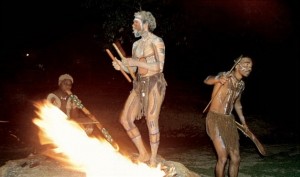It seems evident through the discoveries of anthropologists that early human hunter-gather societies used primitive religion as a means of explaining and understanding phenomenon in the natural world. They did this by invoking supernatural beings and spirits and attributing human personality characteristics to them. If these supernatural beings had the power to alter and influence worldly events and behaved similarly to humans, it’s logic to assume that they could be influenced by human actions as well. Actions performed in order to appease these supernatural beings became ritualized.
Rituals

Rituals were used extensively as Rites of Passage that mark a persons passage through certain cycles of life – birth, manhood, marriage, and death. Rituals are not a unique human trait and it is very likely that ancient rituals came about as an outgrowth of animal rituals for mating, dominance, and the like – much like a bee’s intricate dance or a birds song. In any case, death may have been the most influential rite of passage to early humans and ancestor worship was particularly common among early humans. Rituals involving the death of a person have been observed even among the Neanderthals dating as far back as 40,000 years ago. These rituals were used as a form of communication with the spirits of the dead and the afterlife.
That rituals – patterns of behavior – are used as communication devices provided the means to communicate with spirits in all sorts of realms in addition to the realm of the afterlife. The spirits of the wind, the forest, the sea, and so on could be influenced by and communicated to through ritualized behavior. Ritual also worked to bring cohesion, trust, and order to the social group. Following the agricultural revolution, as human societies began to grow in size and complexity, exiting the hunter-gather state and forming chiefdom’s and eventually city-states, religion served the function of maintaining order, establishing social norms, and providing social control and divine legitimacy to the ruling elite. It is these functions to which we turn our attention to next.
Further reading: Breaking the Spell by Daniel Dennett; The Evolution of God by Robert Wright